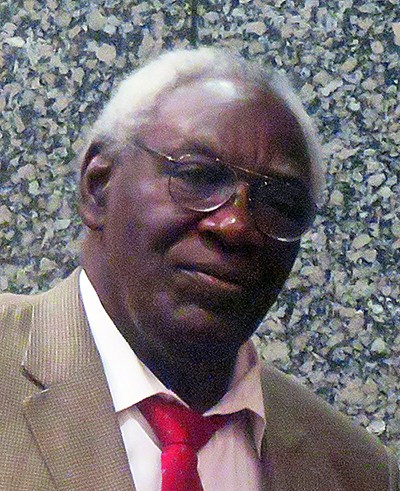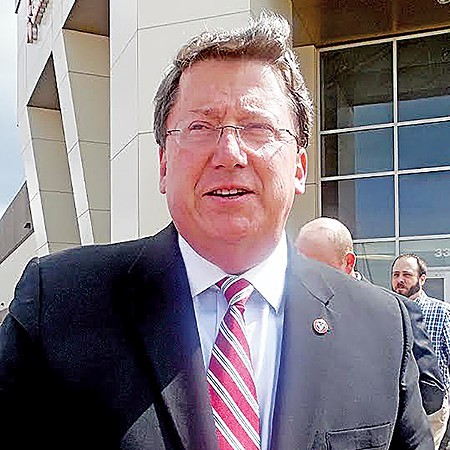As introductory campaign events go, the forum for 8th District congressional candidates held Tuesday night last week by the East Shelby Republican Club at Germantown’s Pickering Center was somewhat tentative — as most such debut cattle calls are — but it contained plenty of foreshadowing of the slings and arrows to come.
Four of the main GOP players were there — state Senator Brian Kelsey, radiologist/radio executive George Flinn, Shelby County Register of Deeds Tom Leatherwood, and advertising man/consultant Brad Greer of Jackson. Missing among the touted contenders were former U.S. Attorney David Kustoff and Shelby County Mayor Mark Luttrell.
The outlier of the group, both geographically and, to a large extent, philosophically, was Greer, whose chances for prevailing are maybe not quite as good as those of then state Senator Marsha Blackburn when she ran for the 7th congressional seat in 2002 against three Shelby Countians— the aforesaid Kustoff, then Shelby County Commissioner (now state Senator) Mark Norris, and then Memphis City Councilman Brent Taylor.
Blackburn, whose home base was Brentwood in Williamson County, campaigned well across the 7th District, even in Shelby County. She would win easily, taking advantage of the split vote among Shelby County natives, none of whom exactly ran like a house afire anyway.
But if Greer’s public image is not as well honed as was Blackburn’s, who at the time was one of the preeminent leaders of the anti-income tax movement in Tennessee, he has even more opponents from Shelby County than had Blackburn in 2002, and thus can count on an even more advantageous split.
 Jackson Baker
Jackson Baker
(l to r) Brad Greer, George Flinn, Brian Kelsey, and Tom Leatherwood in Germantown
Flinn, Kelsey, Kustoff, Luttrell, and Leatherwood (to list them in the order of their campaign financial holdings) could very well divide the vote in their home county of Shelby, wherein resides 55 percent of the 8th District electorate. And that could pave the way for an upset victory for Greer, whose Madison County bailiwick is closer to the traditional heartland of the District, which since 2010 has been served by Crockett County resident Stephen Fincher, who is voluntarily relinquishing the seat.
That might especially be the case if the 8th District votes according to the same pattern as in March on Super Tuesday, when the distribution of votes for the hotly contested Republican presidential primary was, according to Greer, 60 percent in the non-Shelby part of the district and only 40 percent in the Shelby County bailiwick of Flinn, Kelsey, Kustoff, Luttrell, and Leatherwood.
To be sure, Greer has some competition of his own among fellow Jacksonians Hunter Baker, David Bault, and George Howell, none of whom, however, have raised much money at this point or figure to run well-supported races. And prominent Madison County kingmaker Jimmy Wallace, a major force behind Fincher, is putting his eggs this time in the basket, not of Greer, but of Kelsey, who also has good support and fund-raising potential in the Memphis area.
For the record, candidate cash on hand, as of the first-quarter reporting period, was: Flinn, $2,930,885; Kelsey, $439,005; Kustoff, $319,682; Luttrell, $144,570; and Greer, $103,713. No one else had amassed $100,000, or anything close to it. (And Flinn’s total should be taken with a grain — or perhaps an airplane hangar — of salt. Like Donald Trump at the presidential level, he is wealthy enough to self-finance, and, unlike The Donald, actually does so to a substantial degree; he does minimal fund-raising as such.)
All of the foregoing is a recap of the basic paper facts. Last week’s forum at the Pickering Center gave a partial foreshadowing of how the race might be run and of some of the intangibles involved. Herewith are some (admittedly sketchy) reviews of how and what the participating candidates did:
First up was Greer, who established the fact that he represented rural Tennesseans and had handled 18 West Tennessee counties in the 2006 U.S. Senatorial race for Republican victor Bob Corker. He distinguished himself from the others when an audience member asked about trade policy, and Greer wasted no time blasting away, Trump-like at the purportedly ruinous effects of various free-trade pacts on ordinary working folk. “I don’t give a good rat’s ass about other countries before my fellow countrymen,” Greer declared, in what may have been the line of the night.
Flinn was next, and right away declared his fealty to presumptive GOP presidential nominee Trump. He went on to express, as he does in his now-frequently-appearing TV ads, some of the well-worn GOP shibboleths of recent years, fretting that “we’re being killed by entitlements,” and promising to “represent you to D.C., not D.C. to you.” (I can’t help fantasizing about what would happen if the genial and accomplished Flinn dispensed with such pedantic bromides and let fly something defiant about the independence secured by his self-financing, a la “If you like Trump, you’ll love me!”)
Kelsey was third to speak, and in his allotted two-minute introductory spiel, he must have used the self-defining phrase “proven conservative” perhaps 50 times. Okay, that’s hyperbole, but variations on the phrase dominated his brief remarks to an overwhelming degree. In fairness, he did get to elaborate on his record during the Q-and-A portion of the evening, touting his sponsorship of a constitutional amendment to ban a state income tax and his enmity-to-the-death for Medicaid expansion.
Most compellingly, Kelsey signaled his willingness and intent in the future to attack the absent Luttrell, a supporter of Governor Bill Haslam’s ill-fated “Insure Tennessee” proposal: “We have Republicans in this very race who supported extending Obamacare.” And later: “As I mentioned before, we have Republicans who want to expand Medicaid under Obamacare.”
And there was Leatherwood, whose hold on his county register’s job owes much to a neighborly demeanor and a competent, customer-knows-best attitude but who, when running for offices of partisan consequence, prefers to present himself as some kind of avenging Robespierre of the Right. He vies with Kelsey in his contempt for “socialism” and regard for “free enterprise” and, on matters of education policy, gave notice of his wish to purify both state (“Frankly, TNReady is merely Common Core by another name”) and nation, promising to support the abolition of the Department of Education.
In brief, Flinn, Kelsey, and Leatherwood all essentially stuck to well-worn Republican talking points, and Greer evinced at least some disposition, in this year of Trump and Sanders mass assemblies, to go yellow dog.
The next forum for these Republican contenders is scheduled for this Thursday night in Dyersburg.

 Jackson Baker
Jackson Baker 
 JB
JB 






